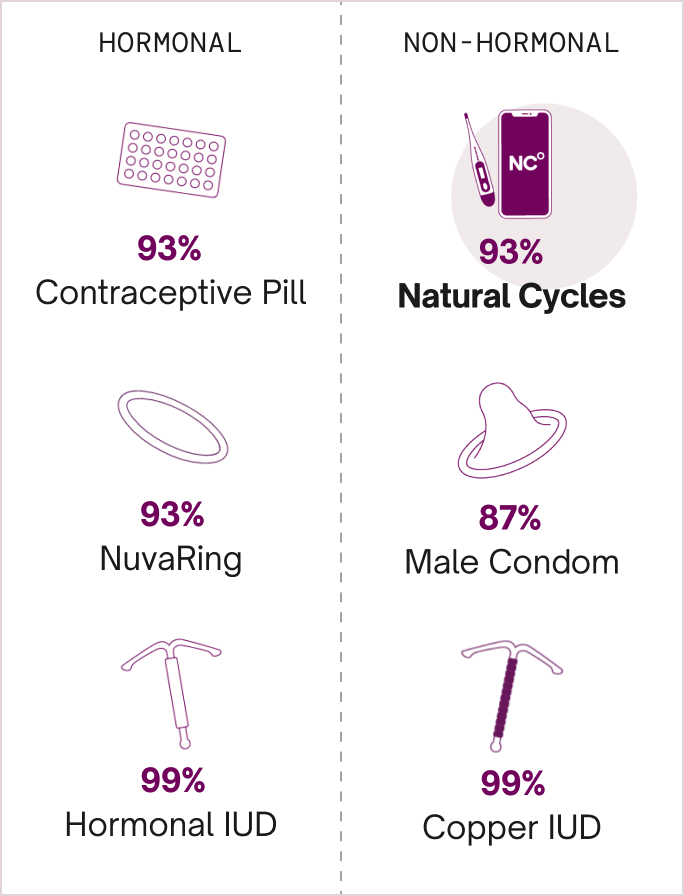5 Tips for talking to your doctor about Natural Cycles
If you’re thinking of switching to Natural Cycles, you may be wondering how to raise this topic with your doctor. Since Natural Cycles is a relatively new form of birth control, there are often many questions from both patients and doctors! This guide can help you prepare with all the info you need to discuss using Natural Cycles as a birth control method with your healthcare provider when you attend your next appointment.
1. Discuss the difference between NC° and period trackers
In recent years, there has been a growing number of people who are choosing to rely on period-tracking apps for contraception. Natural Cycles is different from a period tracker in many ways, and knowing this difference is important when it comes to talking to your doctor about NC°.
Using period trackers as birth control is a bit like using calendar or rhythm methods. These methods presume all menstrual cycles are the same length. In contrast, Natural Cycles uses a unique algorithm that can predict your chances of fertility on any given date based on changes in body temperature and optional urine ovulation test results.
When it comes to accuracy, research shows that Natural Cycles not only provides more days on average when the algorithm deems you not fertile, but the chances of it providing a false fertile day are much lower than other calendar-based methods.
When discussing contraceptive options with your doctor, you may find it helpful to call out exactly how NC° is different from period tracking apps, which brings us to our next talking point.
2. Learn about Natural Cycles' certifications
There’s another key difference that sets NC° apart from period trackers, and that is FDA Clearance. Natural Cycles has undergone rigorous testing and research in order to become a certified medical device. Our 2018 FDA Clearance is based on the analysis of more than 15,000 women who used Natural Cycles as birth control for eight months.
As well as being FDA Cleared for use as contraception in the US, Natural Cycles is also CE Marked for contraceptive use in Europe, listed on the ATG in Australia and Singapore, and most recently, Natural Cycles gained a Class II Medical Device License from Health Canada to be used as birth control. No other cycle-tracking apps have these levels of certification. This level of certification also means that your doctor can write a prescription for Natural Cycles, and then this can be reimbursed by your insurance company, just like the birth control pill.
Natural Cycles continues to take part in regular audits to ensure the algorithm and app meet the requirements of these certifications and to monitor the app's effectiveness so we can continue to provide a hormone-free birth control that’s also a registered medical device.
Natural Cycles uses state-of-the-art security protocols — including encryption and identity protection that ensure your data is protected. We do not share your cycle data with any third parties. This means your data is secure, and your privacy is protected. Learn more about NC° Secure.
3. Talk about birth control effectiveness
When it comes to birth control, the main conversation tends to revolve around how well a method works, and that’s for good reason. Unintended pregnancy can have serious physical or emotional consequences. However, it’s an unfortunate reality that no birth control method is 100% effective.
With typical use, Natural Cycles is 93% effective (that means 7 women out of 100 will get pregnant during a year of using the app). Natural Cycles is 98% effective with perfect use. To add context, the contraceptive pill is also 93% effective with typical use and 99% effective when used perfectly.
To use Natural Cycles perfectly, all you need to do is abstain from sex or use protection on a red (fertile) day.

While talking to your doctor, you may also find it helpful to highlight that Natural Cycles is more effective than traditional family planning methods. It’s also more effective than using condoms on their own. These are 87% effective with typical use and 98% effective with perfect use.
Effectiveness is something we take very seriously at Natural Cycles and this is continually monitored to make sure it’s consistent with results from our original effectiveness studies. Check out our web page on Natural Cycles effectiveness to learn more.
4. Download materials to take to your appointment
The above info is all available in our brochure, which you can download here. It’s designed specifically for patients and healthcare professionals and contains more detailed information surrounding our effectiveness studies, how Natural Cycles works, and the available measuring devices you can pair with the app.
Our website is also packed with useful information, and we even have a section dedicated specifically for doctors and gynecologists. You may find this useful to highlight at your appointment for those who are new to the concept of NC°.
Can’t find the info you’re looking for? Natural Cycles has its own Customer Support Team who are dedicated to answering queries and helping users with the app. Check out the support hub to learn more.
5. Prepare your reimbursement paperwork
As a certified contraceptive method, Natural Cycles is now covered by insurance in the US. In order to get reimbursed, you may need a prescription to use Natural Cycles provided by your doctor. You can save yourself time by learning more about the insurance process and how to get reimbursed via the insurance hub on our website. Then, you can prepare whatever materials you need and bring them with you.
Natural Cycles is dedicated to assisting you with claims and making this process as smooth as possible for our users, so don’t hesitate to reach out if you need assistance with your claim.
Advocate for the birth control you want
We hope this article helps you feel more prepared to talk to your gynecologist about your contraceptive options. To summarize, here are a few useful points that are easy to remember:
- Natural Cycles is an FDA Cleared medical device
- The NC° algorithm uses temperature data to determine fertile days
- Natural Cycles is in the same effectiveness category as the pill (with typical use)
- Natural Cycles works differently from a period tracker
At Natural Cycles, we believe the best way for everyone to access birth control is to have the knowledge and the power to choose from a range of options. There is no one-size-fits-all when it comes to contraception because all our bodies, lifestyles, and preferences are different.
It’s also important to note that Natural Cycles will still work for those with irregular cycles, but the app may provide more ‘Red Days’ than for those with more regular cycles, so you may have more days that you need to use a backup method or abstain from vaginal intercourse. Therefore, it’s important to discuss this with your doctor when deciding if the Natural Cycles is right for you
Whether you’re considering a natural birth control option because you’re sick of side effects or because you want to plan a pregnancy in the not-too-distant future, we want you to feel empowered to take charge of your health and ask for the treatment you want. Why not find out if Natural Cycles could work for you today?
Did you enjoy reading this article?
